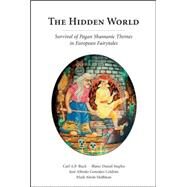The Hidden World
, by Ruck, Carl A.P.; Staples, Blaise Daniel; Gonzalez Celdran, Jose Alfredo; Hoffman, Mark Alwin- ISBN: 9781594601446 | 1594601445
- Cover: Paperback
- Copyright: 5/1/2007
It was mainly only the European urban centers that converted to Christianity, and often more for political or commercial interests, than as a matter of faith. The old religions persisted in the villages or pagani, from which the term Paganism arose. The Christians built their sanctuaries upon the pagan sites, expropriating their numinous past, assimilating the symbolism of the former deities, and commonly incorporating the actual architectural remnants. The wisdom of those deposed gods and their rites persisted in less objectionable forms-disguised to delude the censors-as country festivals and quaint tales often about the fairy folk, who coexisted with this world and could be accessed by magical procedures that perpetuated half-remembered methods of authentic ancient shamanism.Such shamanism always involved pharmaceutical expertise. Mircea Eliade was mistaken in concluding that drugs were characteristic only of the late and decadent stages of a religion. Rock paintings of the greatest antiquity and his own abundant citations indicate that, instead, a pharmacological Eucharist was the norm; and Eliade was himself about to reverse his stance shortly before his death.Encoded in tales seemingly as simple as Snow White with her poisoned red and white apple are themes traceable back to the great epics of Homer and the Mesopotamian Gilgamesh. These patterns of shamanic empowerment lurk also in the histories of the leading families of Europe, who could not completely divest themselves of the former religious basis for their right to rule, but instead they embraced, Christianized, and buried it in sanctified graves, as was the case with the great fairy Melusina, whose eighth abominable son, called Horrible, was murdered. A number of churches involved in the Albigensian heresy claim his body was laid to rest beneath them.






